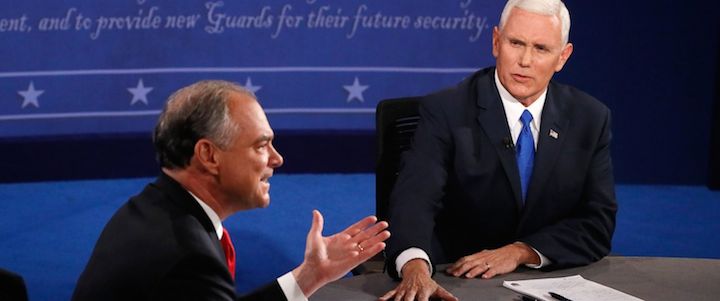It was the debate between the candidates for Vice-President, and Mike Pence said the first words to be said about abortion in any of the debates so far. It came, I regret to say, at a point when the candidates were asked about their “faith.”
That marked the understanding, too widely diffused, that the protection of the unborn depends on “beliefs” held by the religious, beliefs that need not be credited as true by those who don’t share those beliefs.
Still, Pence stirred admiration in the land, on the part of commentators such as Peggy Noonan, when he remarked:
for me the sanctity of life proceeds out of the belief [in] that ancient principle . . . where God says, “Before you were formed in the womb, I knew you.” He was saying God is real, and God made human life, so it is sacred: It all for me begins with cherishing the dignity, the worth, the value of every human life.
That simple point adds something that mere syllogisms cannot supply. For it supplies the account that atheists cannot quite give in explaining what imparts an intrinsic dignity to every human life. But then Pence reached out for an example. He invoked the issue of “partial birth abortion”: “the very idea that a child that is almost born into the world could still have their lives taken from them is just anathema to me.”
That was quite telling, but what it told here was hardly encouraging. Why would Pence take as the most obvious, hard case for the other side the case of killing children at the point of birth. Is he really unaware that this issue has been posed now in terms even starker?
The readers of this site have heard often of that bill passed by the House over a year ago to punish surgeons killing those babies who survive abortions. The vote was 248-177, and all votes in opposition came from the Democrats. That, not merely partial-birth abortion, is the issue on the table right now.
For the official position now of the Democrats is that the right to abortion is not confined to pregnancy. It entails nothing less than the right to kill a child born alive, who survives the abortion. That is the position that Hillary should be made to defend.
And yet even more so Tim Kaine. He professes to be an earnest Catholic, that he had reservations about “partial-birth” abortion. And so: will he vote now in the Senate to bring to the floor for a vote that bill that passed the House a year ago? Will he break now from the pro-choice orthodoxy of his party, his president, and his presidential candidate?
That was such an obvious, inviting point for Pence to make, and if we asked why he didn’t make it, the answer seems comparably obvious. He is quite evidently unaware that there was ever such a pro-life bill passed in the House, and that is a good sign that the Trump campaign is as unaware of the issue, as clueless on this matter, as Pence is.
And how should they be aware of it, after all? For the media have reported nothing on this matter, and even the Catholic commentators on television have said nothing about it.
But the Trump campaign has an impressive list of Catholic Advisers, doesn’t it? Yes, but apparently those Catholic advisers have not thought about raising this, the sharpest of all issues, or – closer to the fact – they have no real influence, no real chance to shape the things said in public by the candidate carrying the pro-life endorsement.
And yet there is nothing new here, for what is reflected here runs back to the time even of Reagan and the first Bush, and it is conveyed in this way: The political leadership tells the pro-life leaders that their interests will be covered by making better appointments of judges. In this way, the political leadership resigns any responsibility to speak to this issue.
That is almost precisely what George W. Bush told the late Fr. Richard John Neuhaus as he was preparing to run for president. And I’m afraid that the pro-lifers have settled for an arrangement of “dhimmitude” here, as in the situation of Christians settling for their subordinate place in certain Muslim countries.
The Republicans are firmly the pro-life party, and they will consistently vote for pro-life measures and support pro-life judges. But less and less will its candidates speak about the matter or take the lead in framing the issue for the public.
That is not the way that the political class understood its relation to the courts in the time of Lincoln, for Lincoln led a national movement to counter and overturn the decision in the famous Dred Scott case, a case threatening to spread slavery to the “free States.”
The late Justice Frankfurter warned: let judges stand in the place of politicians in making the hard political decisions, and rather soon we will bring forth a class of politicians all to ready to avoid those issues that vex their voters. They will be content to leave the controversial questions to those politicians in robes who don’t have to run for reelection.
And that is the Report from Lake Wobegone: that is the state of our national politics now on the issues that people find it hardest to talk about.
















